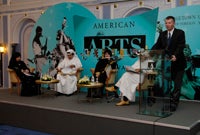American Studies, Dialogue Series, Distingushed Lectures, Race & Society
American Arts Festival Poetry Week

From 16 February to 8 March 2007, the Center for International and Regional Studies (CIRS) in Doha sponsored a series of programs on the American arts, entitled the American Arts Festival. The Center at the Georgetown University School of Foreign Service in Qatar (SFS-Qatar), conducts programs of scholarship, research, and public outreach in the fields of international and regional affairs. CIRS keeps in touch with its surrounding environment by providing various cultural and educational programs that communicate with both the local population and the larger international arena.
Many cultures, including Arab and Middle Eastern cultures, have understood poetry as their most intimate source of identity; so much so that sharing one’s poetry amounts to sharing oneself. But this access to proximity or intimacy is not without difficulties. How can we translate poetry from one language into another, from one culture into another? And still, the 13th century Muslim poet Jalal-ad-Din Rumi is one of the most popular poets in 21st century America. This suggests that poetry might be the best means of crossing cultural boundaries, while being also perhaps the most arduous.
The American Arts Festival featured American poetry, which spanned the songs of Native American shamans to the contemporary lyrics of people celebrating their diverse origins and their common destiny. Can American and Arab poetry mirror each other, enrich each other, and converge in expressing universal aspirations? Our series of poetry readings, workshops, lectures, discussions, and panels of American and Qatari poets, explored these questions and others.
Poetry Week Participant Biographies:
Robert Pinsky served as Poet Laureate Consultant in Poetry to the Library of Congress from 1997 until 2000. Pinsky is an ambassador for poetry and the founder of the Favorite Poem Project, where the American public is given the opportunity to share their favorite poems. In addition to being a distinguished poet, Pinsky is an editor, essayist, teacher and translator. Robert Pinsky’s translation of The Inferno of Dante is a best-seller that has received the Los Angeles Times Book Award and the Howard Morton Landon Prize for translation.
Peter Fortunato is a graduate of Cornell University, with a Master of Fine Arts degree in creative writing from the University of North Carolina, Greensboro. He has taught at Cornell Summer College and at Ithaca College for many years. Mr. Fortunato is a poet and performer and the founder of two poetry and performance theater groups in the US – Spideroot Theater and Spirit Horses. He has published collections of poetry, essays and short stories, and worked as a holistic counselor and life coach. His awards include the Emily Dickinson Prize of the Poetry Society of America and the Pablo Neruda Prize of the Oklahoma Arts Council.
Mohammed Al-Odadi received his Ph.D. in Linguistics from Georgetown University in Wahington DC in 1996. He then moved back to Saudi Arabia, his native country, where he has taught at the Faculty of Languages and Translation, King Khalid University, Abha. He compiled and translated into English poems by HRH Prince Khalid Al Faisal Al-Saud, entitledFires of Love & Mirages of Time: Vernacular Poetry of Saudi Arabia (Barzan Publishing Ltd., 2004).
Roger Bensky, professor of French at Georgetown University, specializes in modern theater. His fields of interest include mysticism, principally Kabbalah. Published works include two books on the symbolism and thematics of puppetry (Nizet, Paris), articles in major French reviews on contemporary dramatists (Beckett, Ionesco, Dubillard, Gatti, Benedetto) and directors (Lavelli, Lassalle, Mesguich, Marechal, Lavaudant).
Amira El-Zein of Tufts University is a translator and published poet. She received her Ph.D. in Arabic language and literature from Georgetown in 1995. Dr. El Zein has published and lectured extensively in Arabic, French, and English on topics ranging from medieval and modern Arabic thought, to Francophone literature, to comparative mysticism, and comparative folklore. Her last book of poetry, The Jinn and Other Poems has just been published by Arrowsmith Publishers in Cambridge, Boston, MA.
Ahmed Abdul-Malik is a writer and visiting lecturer at Qatar University. He received his Ph.D in Journalism from the University of Wales, UK in 1989. Dr Abul-Malik has extensive experience in media and journalism. He has held different positions in Qatar TV and was Editor-in-chief of the English daily (Gulf Times), and the Arabic daily (Al- Sharq). Moreover, he was the Director of Media Department at the Gulf Countries Council (GCC) General Secretariat. He was also the Media Advisor to the Islamic Summit General Coordinator. He has published a variety of professional, social, and literary books.
Zakia Ali Malallah is a Qatari poet, writer and author. She received her Ph.D in Pharmacy from Cairo University in 1990. Currently, Dr. Malallah works for the National Health Authority and also writes for the Al Watan newspaper. She is a member of the National Council for Arts, Culture and Heritage in Qatar. Dr. Malallah has many poetry and translation publications and has received awards for her work including the King Khalid Prize for poetry.
Hessa Al Awadi is a Qatari poet, playwright and author. She has published six volumes of poetry and numerous illustrated books of poetry and short stories aimed at entertaining and educating children and young readers. Al Awadi’s work appears in both English and Arabic.
Ali Mirza is a Qatari artist, and poet. He has acted in, produced and directed numerous plays and has published many volumes of poetry. He is a founding member of the theater movement in Qatar in 1970. He currently heads the Department of Play script and Programs evaluation Department at Qatar television.